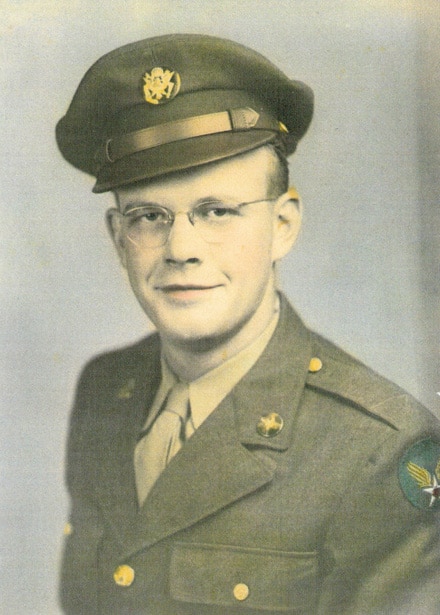
His tour of duty began simply enough. He reported to Basic Training in Gulfport, MS where he was greeted by a familiar face. His first Drill Sergeant, Rex Pate, was from Snellville and the son of Elmer Pate, a prominent resident. Robert didn’t feel particularly uneasy about his tour and signed up for the Army Air Corps as they were rumored to have pretty good barracks and food. Little could he have known that the comforts of familiar faces and places would soon become one of the most cherished of his blessings in life.
Robert, a gunner on a B24, was just fifteen days into his tour of duty which had began on 10 July 1944 when his plane was shot down during his second mission. His crew was part of an attack headed for the Goring Tank Works in Linz, Austria. Their plane was shot multiple times and when it looked like they would not manage to pull out of the valley below them, the pilot ordered the crew to jump. They parachuted from the plane at just 1500 feet to land in the German-held territory.
{gallery}2014rapidgalleries/rrnorton0714{/gallery}
Robert survived the jump but was captured the following day by a gun-wielding civilian and turned over to the German military. From there, Robert and the rest of the captured Allied soldiers were transported by boxcar to Frankfurt where they were interrogated. “Those officers already had all the answers,” remembers Norton. “They had a file on the desk and knew all about our mission.” The boxcar was packed tightly with standing room only. It was hot, the soldiers went without food or provisions. “The only thing they did for us was to let us out during an air raid so we could take shelter,” says Robert. “The Germans also had to protect us from the local citizens or they would have killed us.”
During his time at the prison, there were unimaginable hardships. Food was more than scarce with meager rations that divided Red Cross packages intended for one soldier among four. “They had a recipe for bread that included what they called ‘tree flour’, but it was really sawdust,” says Robert. “We ate lots of boiled potatoes that they cooked up in a huge washtub.”
Robert was among the 80,000 men who were forced to march beginning on 6 February 1945 due to the advancing Russian army. “It was very cold and they called it the Black March,” recalls Robert. “We wore all the clothes we had, and slept in fields or barns with little or no food.” It was grueling and many soldiers did not survive the 800 mile march which lasted until they crossed paths with Allied troops in May.
Robert was liberated by the British on 3 May 1945 and made his way across the Atlantic where he celebrated his 21st birthday during the voyage. “When we got to our barracks at New Port News, Virginia, they fed us a steak dinner,” says Robert. “We were served by German POW’s.” Despite the obvious difference in the treatment of POW’s, Robert was just grateful to be back in the United States.
Robert returned to his family in the US after being discharged just after Thanksgiving 1945.
He returned to Lawrenceville to marry Mary Kelley and began his life which would include running the family Western Auto business in downtown Lawrenceville and being dad to his daughters, Claudia, Nancy and Janet. His nephew, Jimmy Norton, remembers the store as a great place to hang out and thinks his uncle is an American hero. “I get to stand on the shoulders of great men like Uncle Robert,” says Jimmy. “He served his country in War and came home to served his community equally in peacetime”
“I had always appreciated what I had,” says Robert. “I came from farmers, I survived the camp and now I learned to really appreciate what I have.” Family is really what is most important to Robert. He has taken special joy in the recent graduation of his grandson, Johnny Todd, from West Point and Ranger School at Fort Benning along with Granddaughter Lottie Todd’s graduation from the University of Virginia. “All of my children and grandchildren are a comfort to me,” says Robert. “I am proud of all of them.”
Robert Norton’s family, who are all familiar with his incredible tale of survival, have managed to convince Robert that his full story should be shared via modern technology. In order to satisfy the family’s desire to preserve history, Robert has undertaken a video project which will tell the story of life as a WW II POW survivor and forever memorialize those with whom he served. A humble man who says that he has done nothing to deserve any special treatment is working hard to preserve an important part of history, especially for those who did not return. For that, we are grateful to Robert L. Norton.

